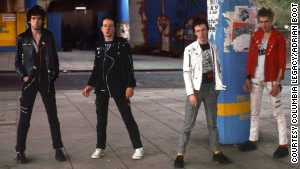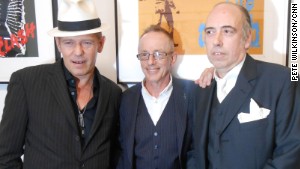By Todd Leopold, CNN
September 10, 2013 -- Updated 1448 GMT (2248 HKT)

(CNN) -- The Clash was falling apart.
More specifically, says guitarist Mick Jones, the band's original master tapes were falling apart. "A bit like nitrate film," he says in a phone interview from Britain.
Except, instead of burning up, the oxide layers to such records as"London Calling," "Sandinista" and "Combat Rock" were disintegrating. To save them and make proper digital masters, the tapes had to be baked in an industrial oven and transferred to other media.
"It has been a bit of a restoration," says Jones. "I don't think it was a moment too soon, because the tapes were rotting -- mold in the boxes and stuff."
But the ultimate result was worth it: spanking-new releases of the band's catalog in a new boxed set called "Sound System." The collection, which is shaped like a boombox, contains newly remastered versions of the group's five official albums, as well as three CDs of demos and singles, a DVD of video footage, a new edition of the "Armagideon Times" fanzine, and even some buttons for that classic 1979 look (denim jacket not included).
The box will be released Tuesday along with a 2-CD best-of called "Hits Back."
The band, of course, broke up long ago -- 1985, two years after Jones was fired. Though relations were soon repaired, there was never a reunion. Singer and lyricist Joe Strummer died in 2002. A year later the group was inducted into the Rock and Roll Hall of Fame.
Their legacy is indisputable -- and not just in the punk movement. Indeed, calling the Clash a "punk band" is like calling the Beatles a "Merseybeat combo." Their music included dollops of rockabilly, reggae, country, rap, soul and jazz, a true mix of styles that made for some of the most exciting records and live shows of the rock 'n' roll era.
The boombox, says bassist Paul Simonon, symbolizes the way the four would share music and ideas. "When we would go out on tour, each member of the band had one of these boomboxes, so in a hotel room or backstage or on some street corner we could play music," he recalls. "Everybody was playing something."
Jones and Simonon talked about the Clash's career in separate interviews with CNN. The following has been edited and condensed.

The Clash: Mick Jones, Joe Strummer, Topper Headon and Paul Simonon.
On their influences:
Mick Jones: The Big Five groups over here -- the Beatles, the Stones, the Kinks, the Who and the Small Faces. I was lucky enough to grow up at the time when they were doing their most fantastic music. When you do music yourself, it's interesting -- it's like a two-way highway. You go back and find out what influenced the people you liked, so you're going backwards, at the same time you're in the present trying to do something. It led us back to so many American artists -- blues, soul and rock and roll.
Paul Simonon: Reggae and rockabilly. And mostly reggae, because that's what I grew up on, and that's the only music that seemed to me at that time that had something to say for itself. Whereas Led Zeppelin, progressive rock, it didn't speak to me. I couldn't relate to it.
On being labeled as a punk band:
Simonon: I don't care about it. People are going to say what they want to say anyway. Some people are going to say, 'They're rubbish.' I don't really care, because I know in my mind what we were. We initially started out as a punk band, but we evolved. We evolved into quite a magnificent rock and roll band, I daresay.
Jones: We can't really deny that's where we come from, but we always hoped to be more. A lot of our contemporaries, if they did make more than one record, they made the same record. And of the people I liked, I was really looking forward to their new record coming out, because I knew they were doing something different. I knew they weren't going to do the same thing every time. That was like a given with us. That was only natural -- I always knew we were never going to make the same record twice.
On their fashion choices:
Simonon: That was my department, really. If you go see a band and they look amazing, you get really inspired. But if the band looks not very well-dressed, it's hard to get inspired by the music. As our manager said, if somebody goes to see a band, and the audience is better dressed than the band, then why should the audience listen to what the band have to say?
There's a like-minded thought process going on at this time anyway. We don't want flares, we want straight-leg trousers. The whole world's got flares. And everybody's got long hair -- (so) we want short hair. It was very tribal, too. You had the mods, you had the rockers, you had skinheads, you had hippies, people were very defined by how they looked, and it reflected the music they liked, too.

The Clash today: Left to right, Paul Simonon, Topper Headon and Mick Jones.
On "the only band that matters":
Jones: The record company came up with that; it wasn't us. We weren't like trying to blow our own trumpets. It was kind of a moniker and it stuck. Every group wants to be the best group when you're young.
On becoming stars:
Jones: I remember once, I was talking to Pete Townshend (at a stadium show). I said I know what "quadrophenia" means now, because if you look in one direction, you're ignoring 50,000 people! He just looked at me like I was mad.
It was a big thing, but we had something we wanted to say, so it was interesting to see how we'd get on in that environment.
Simonon: In the early days when we first started out in a hotel room, it wasn't a great hotel room, but the hotel was better than where I lived. Then as the journey continues you get more successful, suddenly the hotel rooms have one big bed in it rather than two narrow beds that you have to share. So it's a gradual thing. When you do get to the point where you're in the lap of luxury, it's easy to lose contact with yourself and where you're from.
In some ways it's not a bad thing that the Clash split up when they did, because we would have become "the only band that mattered" and very pompous. So maybe in some ways cutting your own throat was a good idea at the time. Who knows what sort of people we would be now?
On writing songs with Joe Strummer:
Jones: It started off as, "We need another song." "OK, give us five minutes," and we'd go upstairs to rehearsals and bang something out. At the other end of the scale would be, I don't want to see him, just post the lyrics through the post box.
(Sometimes) he would sit at the typewriter and bang it out like a guy who worked at the newspaper, and he'd pull it out of the typewriter and hand it across the table. It was always pretty quick.
It usually comes naturally, especially with Joe's lyrics. Even the tune was there sometimes. It was the words, really, and the music was kind of a vehicle for those words.
On feeling Strummer's presence while preparing "Sound System:"
Jones: Yeah, it's impossible not to. (Because) it was his words that carried the whole thing, or was the most important thing to it, I like to think he was with us. He's definitely with us through his music, and somehow with us in spirit, as well. (sounds a little choked up) I feel that, anyway.
In some ways it's not a bad thing that the Clash split up when they did, because we would have become 'the only band that mattered' and very pompous.
Paul Simonon
Simonon: No. The reason I say that, is because it's like each person in the band was an individual. There was no leader. We spent seven intense years working together, so you get a pretty good idea of how each other is.
Getting along:
Jones: We became friends very soon after, that was the main thing. I've had a great time these last couple years while we've been putting this box together. It's been wonderful to spend time with the guys, and have complete creative control over all our work.
Simonon: I see Mick and we do things. We went to a play once (in which) they wanted to use the song "Know Your Rights." They invited us to the play. What they didn't realize was that back when the record was being recorded me and Mick had like a two-hour argument in the studio about the bass sound. I said it needed to be not louder, but a bit deeper. So we went to see this play. And I heard the song being played back, and it sounded really tinny. And I turned to Mick and said, "I told you I was right!"
There's no antagonism anymore. We're sort of grown up now. We know that we were really fortunate to be working together at the time that we did.
No comments:
Post a Comment